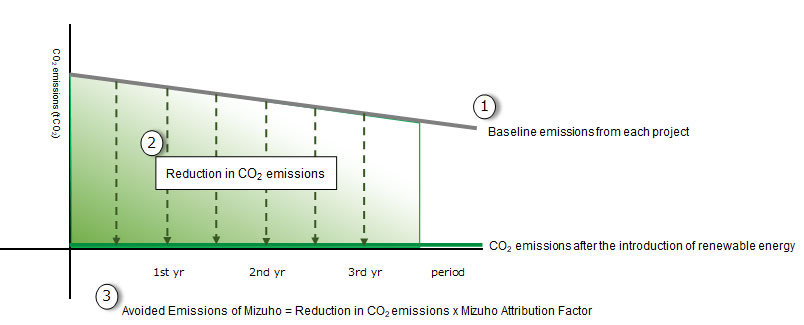Carbon Accounting Based on PCAF
Carbon accounting is the evaluation of business activity by calculating and tallying how much Greenhouse Gas (GHG) they produce, as well as the degree to which business activities contribute to reducing GHG emissions. As an initiative to address climate change, Mizuho Bank developed its own carbon accounting methodology to measure CO2 emissions by power generation projects it has financed. We began disclosing the results of our evaluations in fiscal 2006. We disclose the further reliable and transparent information by utilizing the concept of PCAF, one of international initiatives, since fiscal 2019. We are utilizing these results as information for future management to support the movement toward a decarbonized society.
Carbon accounting overview
What is PCAF?
It means Partnership for Carbon Accounting Financials, a framework for financial institutions to calculate consistently GHG emissions derived by businesses that they invest and/or finance.
(https://carbonaccountingfinancials.com/)
We have applied our own carbon accounting to new large–scale power generation projects for which financial agreements were signed in the respective fiscal year since fiscal 2006. We disclose the information against project finance for power generation projects based on PCAF concept since fiscal 2019.
CO2 Emissions
We calculate the CO2 emissions based on the below formula described under PCAF Standard.
Financed Emissions of Power Sector Portfolio = Σ (Annual Power Generation × Sectorial Emission Factor × Mizuho Attribution Factor)

CO2 Avoided Emissions
The term "avoided emissions" refers to the quantified contribution of a company to the reduction of total GHG emissions from the whole of society through the use of its products and services. While it is important for a company to work toward reducing GHG emissions including from its value chain, any increase in economic or business activities invariably leads to a rise in GHG emissions. It is thus more crucial than ever to measure avoided emissions accurately and to financially support decarbonizing solutions in order to reconcile economic growth with reduction in GHG emissions.
Mizuho adopts the concept of Avoided Emissions under the PCAF Standard for the purpose of measuring the reduction in emissions from our project finance portfolio. This calculation is based on the emission factor of the fossil fuel that has the largest impact on the power generation mix in the project region and CO2 emission reductions contributed by the renewable power projects that Mizuho finance. The above Mizuho Attribution Factor is used for calculating CO2 avoided emissions in line with PCAF Standard.
Conceptual Diagram of Avoided Emissions

- Baseline emissions from each project: Theoretical CO2 emissions calculated using the emission factor of fossil fuel that has the largest impact on the power generation mix in the project region, serving as the base scenario of reference for the project concerned.
- Reduction in CO2 emissions: Calculated for each project as the difference between the CO2 emissions after the introduction of renewable energy and the baseline emissions.
- Avoided emissions of Mizuho: Calculated by multiplying each project’s reduction in CO2 emissions by Mizuho Attribution Factor.
* The above diagram simply illustrates the concept and does not necessarily represent the situation of a specific project.
Results of Evaluations
Results based on PCAF
| Unit | FY 2019 | FY 2020 | FY 2021 | FY 2022 | FY 2023 | |
| Financed Emissions of Power Sector Portfolio | kton CO2 | 8,901 | 8,627 | 8,765 | 10,308 | 10,502 |
| CO2 Avoided Emissions of Power Sector Portfolio | 4,349 | 4,688 | 4,871 | 6,390 | 6,942 |
Mizuho believes that an orderly transition needs to consider national and local realities, because the pathway to the decarbonization of electricity varies depending on energy security considerations and geographical/social factors specific to the country or locality. It is for this reason that financed emissions from Mizuho's power sector portfolio may increase due to specific conditions of the country or locality concerned. Nevertheless, this does not change Mizuho's commitment to the decarbonization of the whole of society through continued support for the promotion of renewable energy going forward.